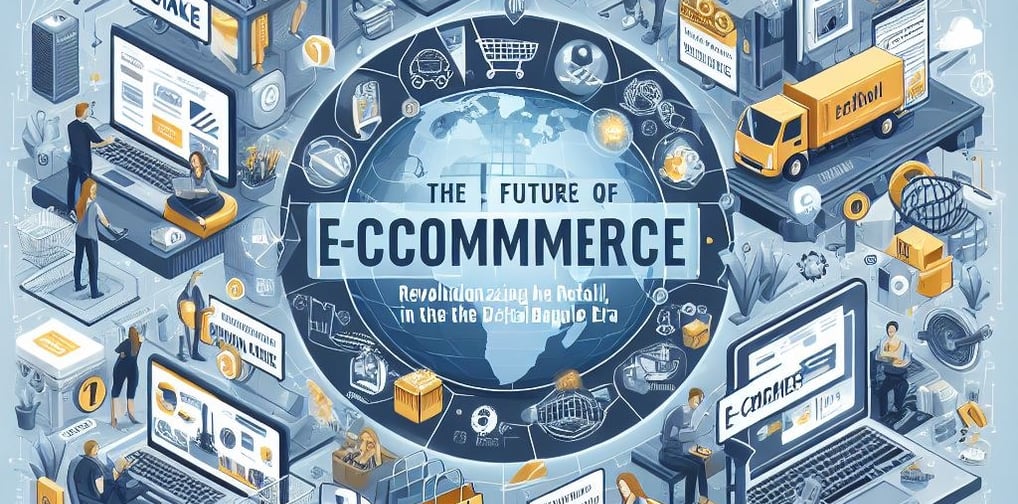
Unveiling the Dynamics of E-commerce: Key Insights and Trends
This article is a comprehensive, detailed guide to The Dynamics of E-commerce: Market Trends, Technology, and Consumer Behavior.
IT SERVICES
4/11/20244 min read



Introduction to E-commerce
E-commerce, short for electronic commerce, has become an integral part of our lives in the digital era. It refers to the buying and selling of goods and services over the internet. With the advancement of technology, e-commerce has revolutionized the retail industry, offering convenience, accessibility, and a seamless shopping experience to consumers worldwide. In this blog post, we will delve into the dynamics of e-commerce, exploring its market trends, the role of technology, consumer behavior, logistics and supply chain, challenges, e-commerce platforms, payment solutions, regulatory environment, and emerging trends.
Revolutionizing Retail in the Digital Era
The rise of e-commerce has transformed the retail landscape, challenging traditional brick-and-mortar stores and opening up new opportunities for businesses. Online shopping has gained popularity due to its convenience and the ability to shop anytime, anywhere. Consumers can browse through a wide range of products, compare prices, read reviews, and make purchases with just a few clicks. This shift in consumer behavior has forced retailers to adapt to the digital era by establishing an online presence and providing a seamless shopping experience across multiple channels.
Market Trends: A Deep Dive into the Growth Trajectory
E-commerce has witnessed remarkable growth over the years, fueled by technological advancements and changing consumer preferences. According to recent statistics, global e-commerce sales are projected to reach trillions of dollars in the coming years. The increasing penetration of smartphones, the availability of high-speed internet, and the rise of social media have contributed to the exponential growth of e-commerce. Furthermore, the COVID-19 pandemic has accelerated the adoption of e-commerce, as consumers turned to online shopping to meet their needs while adhering to social distancing measures.
The Role of Technology in Powering the E-commerce Ecosystem
Technology plays a crucial role in driving the success of e-commerce. From user-friendly websites and mobile apps to secure payment gateways and efficient logistics systems, technology enables businesses to provide a seamless shopping experience to their customers. Artificial intelligence and machine learning algorithms are being utilized to personalize product recommendations, improve search results, and enhance customer service. Additionally, technologies such as augmented reality and virtual reality are being integrated into e-commerce platforms to enhance the visualization and try-on experience for customers.
Consumer Behavior: Understanding the Digital Shopper
Understanding consumer behavior is essential for the success of any e-commerce business. Online shoppers have different expectations and preferences compared to traditional retail shoppers. They value convenience, variety, competitive pricing, and a seamless shopping experience. E-commerce businesses need to invest in user-friendly interfaces, intuitive navigation, and personalized recommendations to cater to the needs and preferences of their target audience. Analyzing customer data and leveraging insights can help businesses tailor their marketing strategies and product offerings to meet the evolving demands of digital shoppers.
Logistics and Supply Chain: Overcoming Challenges for Seamless Delivery
Efficient logistics and supply chain management are critical for the success of e-commerce businesses. Timely delivery, order tracking, and hassle-free returns are key factors that influence customer satisfaction and loyalty. E-commerce companies need to establish robust partnerships with reliable logistics providers and optimize their fulfillment processes to ensure smooth operations. Warehousing, inventory management, last-mile delivery, and reverse logistics are some of the areas that require careful attention to meet customer expectations and maintain a competitive edge in the market.
E-commerce Platforms: Exploring the Landscape of Online Marketplaces
E-commerce platforms provide the infrastructure and tools for businesses to sell their products and services online. Online marketplaces such as Amazon, eBay, and Alibaba have gained immense popularity, offering a wide range of products from various sellers. These platforms provide businesses with a ready-made customer base, marketing opportunities, and secure payment solutions. Additionally, businesses can choose to build their own e-commerce websites or utilize platforms like Shopify, WooCommerce, or Magento to create their online stores.
Understanding Different E-commerce Models: B2B, B2C, D2C, and C2C
E-commerce encompasses various business models that cater to different types of transactions. Business-to-business (B2B) e-commerce involves transactions between businesses, where one business sells products or services to another. Business-to-consumer (B2C) e-commerce refers to transactions between businesses and individual consumers. Direct-to-consumer (D2C) e-commerce allows brands to sell their products directly to consumers, bypassing traditional retail channels. Consumer-to-consumer (C2C) e-commerce involves individuals buying and selling products or services to each other through online platforms.
Payment Solutions: Facilitating Secure Transactions
Secure and convenient payment solutions are crucial for the success of e-commerce. Customers need to trust that their payment information is protected during online transactions. E-commerce businesses utilize various payment methods, such as credit cards, debit cards, digital wallets, and online payment gateways, to facilitate secure transactions. Implementing encryption technologies, two-factor authentication, and fraud detection systems is essential to ensuring the security of customer data and preventing unauthorized access.
Regulatory Environment: Navigating Legal and Compliance Issues
E-commerce operates within a complex regulatory environment that varies from country to country. Businesses need to comply with legal requirements related to data protection, consumer rights, taxation, intellectual property, and cross-border trade. It is crucial for e-commerce businesses to stay updated with the evolving regulations and ensure compliance to avoid legal issues and reputational damage. Engaging legal professionals and implementing robust compliance frameworks are essential for navigating the regulatory landscape.
Emerging Trends: Innovations Shaping the Future of E-commerce
The e-commerce industry is constantly evolving, driven by technological advancements and changing consumer expectations. Several emerging trends are shaping the future of e-commerce. These include the integration of artificial intelligence and chatbots for personalized customer service, the rise of voice commerce through virtual assistants, the adoption of social commerce through platforms like Instagram and Facebook, and the expansion of cross-border e-commerce facilitated by improved logistics and trade agreements. Additionally, sustainability and eco-friendly practices are gaining traction, with consumers demanding transparent and responsible business practices from e-commerce companies.
Conclusion
E-commerce has revolutionized the retail industry, offering convenience, accessibility, and a seamless shopping experience to consumers worldwide. The dynamics of e-commerce encompass various aspects such as market trends, the role of technology, consumer behavior, logistics and supply chain, challenges, e-commerce platforms, payment solutions, the regulatory environment, and emerging trends. As the e-commerce landscape continues to evolve, businesses need to adapt and embrace innovation to stay competitive and meet the ever-changing demands of digital shoppers.
We hope this is helpful. Please let us know if you have any questions.
We appreciate your attention. Please like and share. Thanks
info@buzzyedge.com
